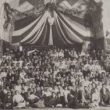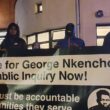By Summer Conneely
Beginning at Columbia University and spreading across the world, the encampments protesting the Israeli State genocidal campaign in Palestine have been said by some to be the most significant student protests since the anti-Vietnam War movement. With the encampments spreading to colleges worldwide, it was inevitable that young people disgusted and radicalised by this murderous genocide within Ireland would join.
On Friday, 3 May, students at Trinity College Dublin, led in part by TCDSU and TCD BDS Society members, began their encampment, notably blocking the Book of the Kells, which brings in approximately €244,000 per week. The immediate demands were (1) Sever ties with all Israeli institutions, organisations, and investments, (2) Express unequivocal condemnation of the ongoing genocide, settler-colonialism, apartheid, and occupation of Palestine, and (3) Recognize Trinity College’s complicity with the ongoing genocide, and commit to supporting 100 Palestinian scholars to study at TCD fully.
University to clampdown
Almost immediately, Trinity closed student facilities, severely limiting access to various buildings and facilities on campus, in a clear attempt to limit the encampment’s growth and morale and pit other students against the protest action. Their efforts failed on both accounts. A poll of Trinity students released on 6 May showed 80% approved of the encampment, with 86% expressing disapproval of the college’s response to the Israeli State genocide in Gaza. Additionally, 89% of students opposed the outrageous €214,000 fine, which had been issued to the Student Union for various protests at the Book of Kells.
While the college managed to limit the flow of participants in and out of the college, the camp maintained a solid base, and importantly, morale stayed high. A march in support of the encampment was held on its second day, and what followed was a constant rally of supporters outside Trinity for the next day, accompanied by seemingly endless donations of food and other supplies. This massive show of support and solidarity, both with the encampment and the Palestinian cause more broadly, was invaluable for its continuation and success.
Forced to concede demands
On 8 May, following talks between representatives and university management, an agreement was reached on a number of demands. Firstly, Trinity confirmed it will divest Israeli companies in the Occupied West Bank and later announced it will divest from all Israeli companies. The University also announced a commitment to fully supporting a number of Palestinian scholars to study at Trinity. Finally, the University announced the creation of a task force reviewing various economic and academic links to Israeli institutions, including staff and student representatives. While we must ensure that these decisions are held to and these divestments don’t simply die in committee, these announcements by the university represent a serious shift in tone and language. It represents a huge victory for the Palestine solidarity movement.
A large assistance for the encampment was the mass support amongst ordinary people in Ireland for the people of Palestine. This acted both as a pressure on the university to give in to the student’s demands and as a barrier against the brutal police violence seen against encampments in countries like Germany and the US.
If you fight, you can win
The encampment shows concrete proof that if you fight, you can win. It also shows the radical and exemplary lead given by TCDSU, combined with the mood to fight back against this appalling genocide, delivers results. It is an inspiring action that must be followed; there can be no business as usual while this genocide continues. Crucial to taking action against the Gaza genocide is the necessity of collective action, and taking actions like the blocking of the Book of Kells will be necessary.
Workers should heed the call of Palestinian trade unions to refuse the handle goods destined to and from Israel on Nakba day (the day commemorates the ethnic cleansing of Palestinians from their historic homeland after the Israeli State came into existence), 15 May, and they must have the full backing of the trade union movement when doing so. As the murderous assault on Rafah is being stepped up, we must organise and strike back now.












